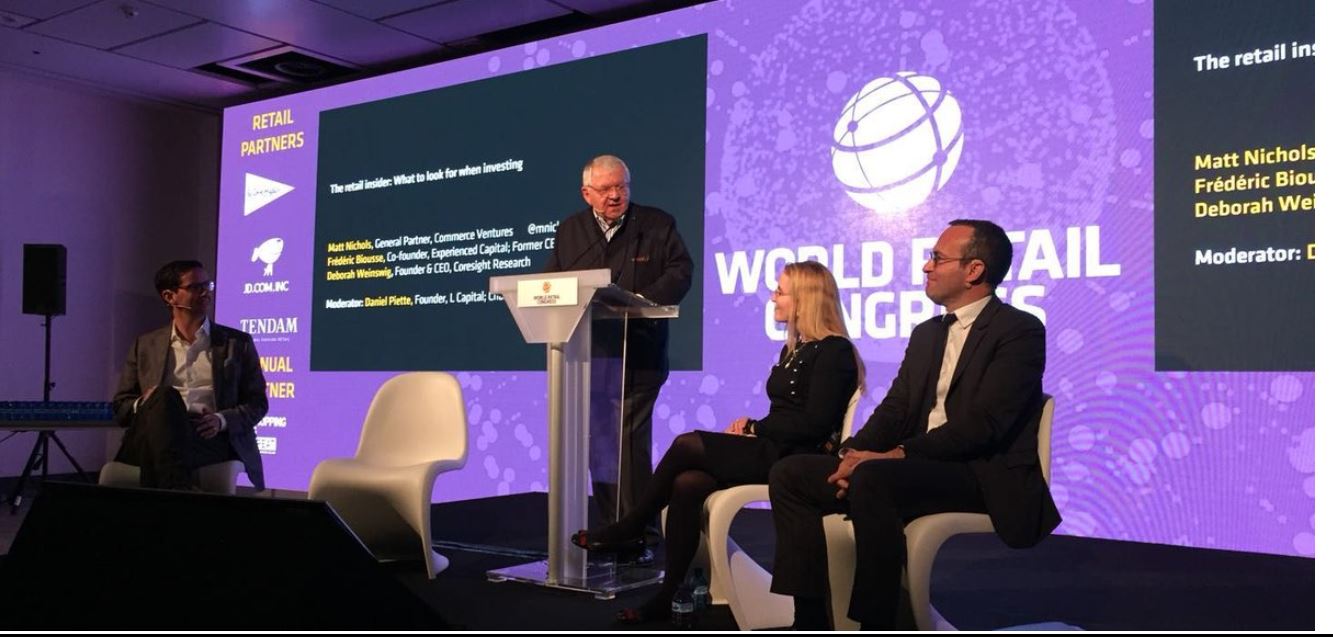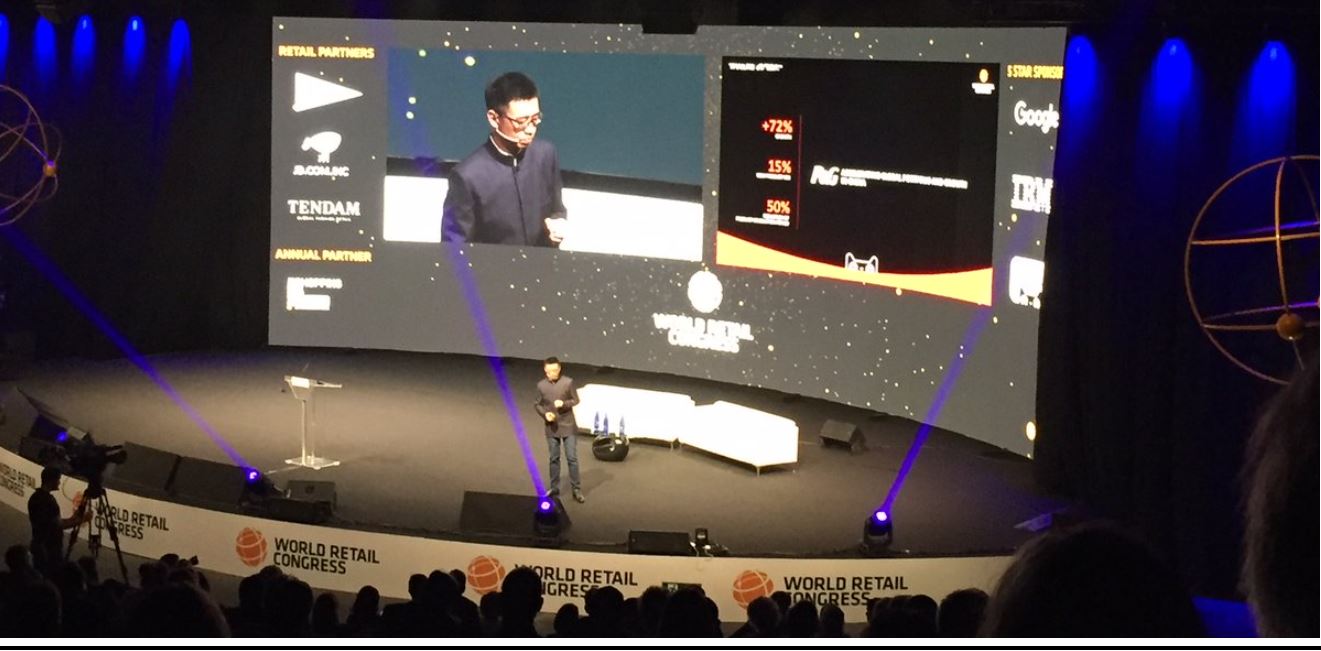
Web Developers
The Coresight Research team is attending World Retail Congress 2018 in Madrid this week. Here are our top takeaways from day one of the conference:
The Coresight Research team is attending World Retail Congress 2018, which is taking place in Madrid April 17–19. Here, we feature our takeaways from the first day of the conference.

Kicking It Off
The congress kicked off with Coresight Research CEO and Founder Deborah Weinswig hosting a fireside chat with Loren Padelford, VP and General Manager of e-commerce platform provider Shopify Plus. The conversation ranged from technology to retail channels to store closures.- Padelford said that he often asks retailers where they would spend an extra dollar—on technology or on the retail experience? He said that if they answer “technology,” he views them as a tech firm rather than as a true retailer.
- Padelford is seeing retailers return to focusing on the experience and product, and leaving the technology to specialized tech firms. Retailers are no longer trying to do everything themselves, he said.
- The “retail apocalypse” story is “great clickbait,” Padelford said. But he noted that retail has always seen store closures and that we are just in a period in which this is happening more quickly.
- Retailers do not care much about consumer packaged goods (CPG) brands anymore, Padelford said, because retailers are creating their own brands. CPG firms must disintermediate and go directly to consumers, he said, noting that this imperative has led a number of major CPG firms to learn to act like startups.
Investing in Retail
Later in the day, Coresight Research’s Weinswig returned to participate in a panel discussion entitled “The Retail Insider: What to Look for When Investing in Retail.” During that discussion:- Daniel Piette, Founder of L Capital, said that he thinks it would be “extremely dangerous” for a new retailer to embark on a substantial store-opening program today.
- Weinswig argued that personalization, customization and localization, plus AI, will feed into new brands—possibly including luxury brands—that emerge on e-commerce marketplaces.
- Matt Nichols, Partner at Commerce Ventures, commented that Internet pure-play retailers look too expensive to buy, a notion other panelists agreed with. However, Weinswig noted that major CPG firms are looking for beauty acquisitions and this makes investing in digital beauty brands more attractive. Piette was more skeptical about buying into digital beauty brands, noting that they are vulnerable because their “communities” could head to rival brands and that they lack proprietary product content.
- Frédéric Biousse, Cofounder of Experienced Capital, argued that brick-and-mortar formats are the only way for digital-first brands to grow in the long term. However, all of the panelists were skeptical about the idea of investing in brick-and-mortar retailers that sell only other companies’ brands.

Source: Coresight Research
Hearing from JD.com and Alibaba’s Tmall
The first day of the conference featured keynote addresses by senior management of Chinese e-commerce giants JD.com and Alibaba Group. Richard Liu, Founder, Chairman and CEO of JD.com, discussed some distinctions in Chinese retail and offered his views on the future of retail. He said that European retail tends to change more slowly than Chinese retail, and he pointed to a lack of loyalty among Chinese consumers, noting that shoppers in China are more likely to try out a new store when it opens than shoppers in Western markets are. Liu also noted that Chinese consumers have shifted from looking for low-price products to opting for premium brands. Looking ahead, he said that JD.com is trying brick-and-mortar formats. The company has just opened a new supermarket format and it plans to put convenience stores in many Chinese villages. Despite this push into “old” retail formats, Liu predicted that, sooner or later, the retail industry will be operated by AI and robots, rather than by humans. Jet Jing, President of Alibaba Group’s Tmall, highlighted the appeal of Tmall and its sister site, Tmall Global, for Western brands and retailers seeking to capture a share of the high-growth Chinese market. Jing said that Tmall is the “gateway to China” and that Western retailers don’t have to put up with just surviving with Amazon, because they can thrive with Tmall. Some 18,000 international brands have sold on Tmall in the past few years. However, Jing pointed to the need for brands to adapt to Chinese demands, and especially the need for them to undertake rapid product innovation; brands that do not innovate in China will die, he said. He noted that CPG giant Procter & Gamble used big data analytics to identify consumer trends in China and then rapidly tested dozens of new products by listing them on Tmall. Jet Jing, President of Alibaba Group’s Tmall
Source: Coresight Research
Jet Jing, President of Alibaba Group’s Tmall
Source: Coresight Research
Takeaways in Brief
Apparel-tagging firm Avery Dennison sees the future of retail as centering on the Internet of Things, enabled by RFID technology. The firm sees a future of frictionless shopping, underpinned by the RFID tagging of everyday product purchases. This will allow retailers greater stock visibility and provide consumers with greater brand transparency (letting shoppers see where a product was made, for example). In addition, it will provide data that enables greater analytics. Steven Dennis, President of SageBerry Consulting, pointed to the “collapse of the middle” in US retail, but, like Loren Padelford, Dennis was skeptical about the retail apocalypse narrative. Dennis pointed to seven specific steps that legacy retailers can take to defend their positions: be channel agnostic, be digital-first, offer personalized and curated propositions, adopt a mobile-first stance, leverage social media’s shift from sharing to buying, be “remarkable at scale” with in-store experiences, and, finally, take risks, test and learn. In a panel discussion on the “tech tide” that is sweeping retail, Tom Athron, Group Development Director at John Lewis, pointed to the challenges retailers face in equipping their businesses for change. Retailers have so much tied up in delivering for today that it is very difficult for them to reallocate resources away from areas that deliver core profits and toward something new, he said. In addition, Athron noted that new stuff starts small and that projects and initiatives can feel insignificant or detached. In the future, machines plus humans will provide a better mix for retail than either machines or humans alone, he forecast.- Keep an eye out for our reports on days two and three of World Retail Congress 2018.